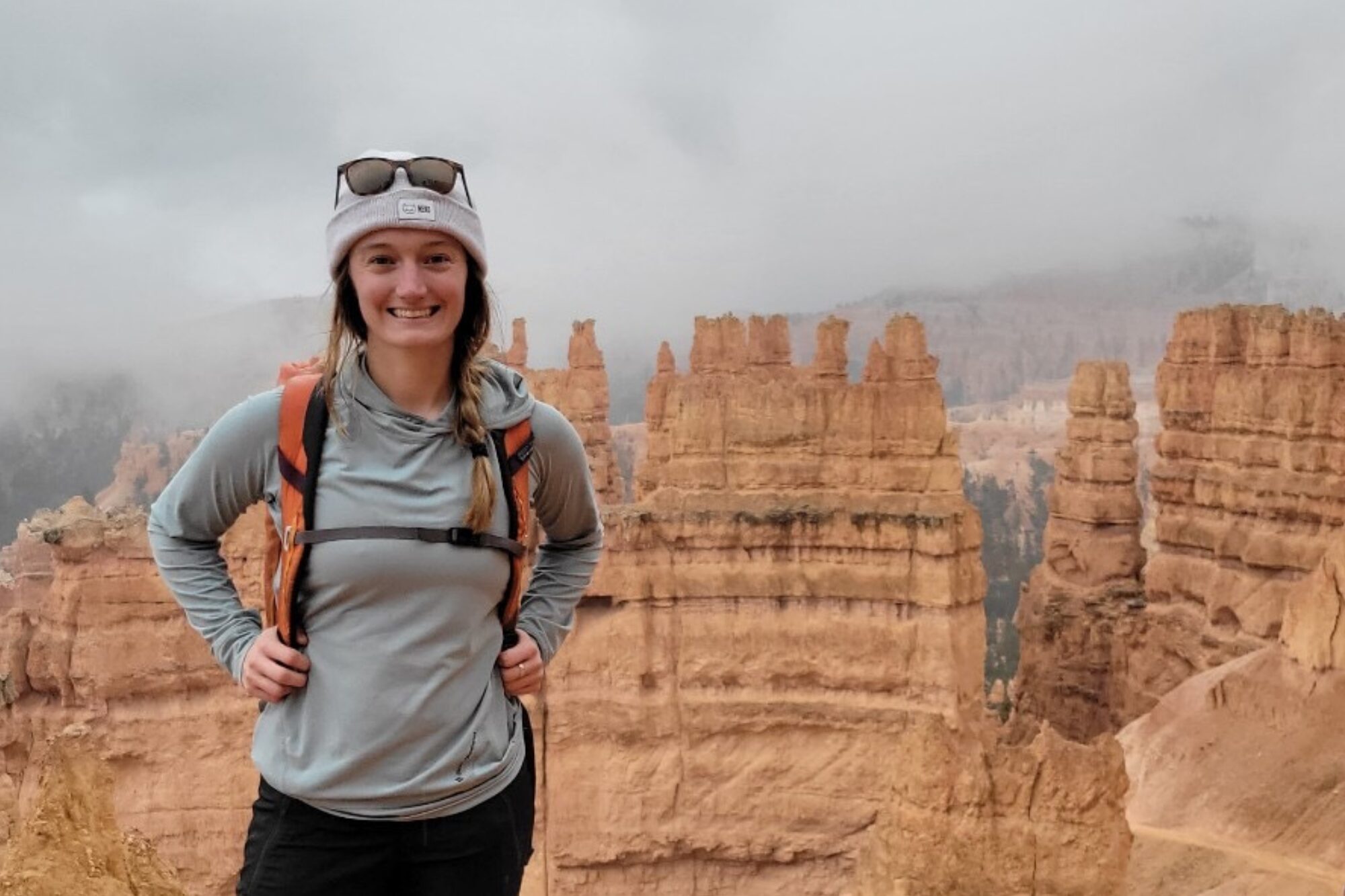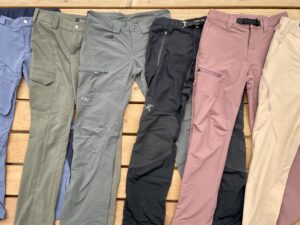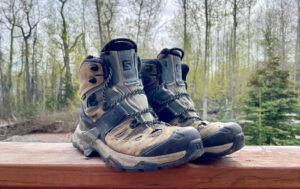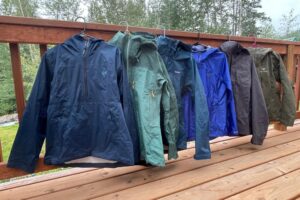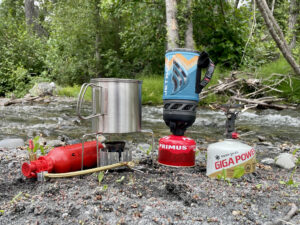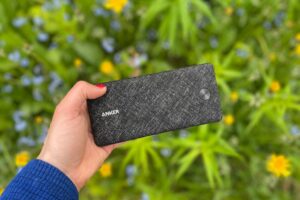In recent years, outdoor adventurers have become more careful about sun protection, as the dangers of sun exposure become better known and skin cancer rates continue to rise. It’s rare to be at a trailhead or crag these days and not see someone wearing a sun shirt, the hood pulled up to protect their face from UV rays.
The ExplorersWeb team is a big fan of sun shirts, and we wear them for everything from backpacking to climbing to packrafting to gardening. We like sun shirts that are breathable, comfortable, and odor-resistant. A high UPF rating helps increase a sun shirt’s UV protection, as do hoods and thumb loops.
With so many sun shirts on the market these days, it can be difficult to know which is the right one for you. Luckily, we did the hard work for you, testing 10 different sun shirts to find our favorites. Gear Editor Chelsey Cook took on the lion’s share of testing, wearing different sun shirts while guiding in the Alaska Range and Peru, as well as on personal trips in the canyons of Utah and volcanoes of the Pacific Northwest.
As someone who’s had several friends already diagnosed with skin cancer in their 30s, Chelsey takes sun protection seriously. She is rarely without a sun shirt, even in the frontcountry. The sun shirts she chose for this guide are a good mix of fashionable and functional, synthetic and natural fibers, and light to medium weights.
Our Picks for the Best Sun Shirts
- Best Overall Sun Shirt: Black Diamond Alpenglow Hoody
- Best Sun Shirt for Hot Weather: Patagonia Tropic Comfort Natural Hoody
- Best Sun Shirt for Women: Kari Traa Sanne Sunshirt
- Best Natural Fiber Sun Shirt: Voormi River Run Hoodie
- Best Button-Up Sun Shirt: Outdoor Research Astroman Sun Shirt
Best Overall Sun Shirt:
Black Diamond Alpenglow Hoody
Features: 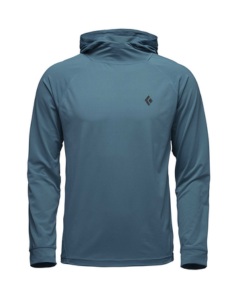
- UPF 50+ and in-fiber cooling technology to reflect 71% of near-infrared rays
- Under-the-helmet hood design
- Polygiene odor control
- Underarm gussets for increased range of motion
Why we like it: Incredibly lightweight, durable, and comfortable
What we don’t like: Zip pocket is not accessible when wearing a harness or hip belt, no thumbholes
Materials: 87% polyester, 13% elastane | Weight: 8.6 oz. | Pockets: Yes | UPF: 50+
The Black Diamond Alpenglow Hoody ($95) has been Chelsey’s go-to sun shirt for several years. She practically lives in hers during her mountain guiding seasons. She also wears one while teaching mountaineering courses in the Alaska Range and leading backpack trips in Alaska and Peru.
She loves the loose, breathable material and finds it comfortable in warm and cool temperatures. The deep hood pulls over her baseball cap and the panel along the collar helps protect her neck. Although made of polyester, the Alpenglow Hoody has surprisingly good odor control and feels fresh even after several consecutive days of wear.
There are no thumb loops, but the sleeves are long and drapey enough to cover the backs of the hands. A small zip pocket is along the right side of the hem. However, its placement makes it difficult to access while wearing a climbing harness or a backpack’s hip belt.
Check Men’s Price at Black Diamond
Check Women’s Price at Black Diamond
Best Sun Shirt for Hot Weather:
Patagonia Tropic Comfort Natural Hoody
Features: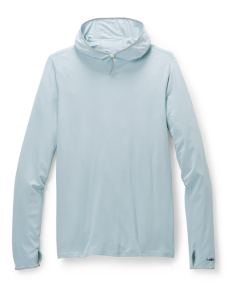
- Made from renewable, beech tree pulp modal fabric
- Long sleeve length with thumb loops for added protection
- Generous hood fits over a baseball cap
- Made in a Fair Trade Certified™ factory
Why we like it: Lightweight, super soft, and cool against the skin
What we don’t like: Currently only offered in light colors
Materials: 96% modal sun, 4% spandex | Weight: 9.4 oz. | Pockets: Yes | UPF: 40+
Chelsey could barely manage to take the Patagonia Tropic Comfort Natural Hoody ($99) off while she was testing it, it was so comfortable. The buttery soft, breathable, and lightweight fabric is especially good for hot climates. The silky feel is thanks to the modal fabric, created from renewable, beech tree pulp. Modal fabric is eco-friendly, and more sustainable than synthetic fabrics and more durable than cotton. It also retains its hygroscopic properties after washing, giving it long-lasting odor control.
The Tropic Comfort Natural Hoody also has a generous hood and thumb loops for added protection.
Check Women’s Price at Backcountry
Best Sun Shirt for Women:
Kari Traa Sanne Sunshirt
Features: 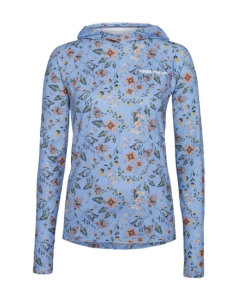
- Secure hand pocket to keep important items safe
- Made from recycled polyester
- Curved hem for extra coverage when bending and sitting
- Thumbholes for a secure fit
Why we like it: Relaxed fit, fun patterns
What we don’t like: Material feels a little heavy on the skin
Materials: 90% polyester, 10% elastane | Weight: Unknown | Pockets: Yes | UPF: 40+
The Kari Traa Sanne Sunshirt ($60) is a women’s specific sun shirt, with a loose fit, raglan sleeves, and a curved hem. Chelsey loves the fun colors and patterns, and the flattering fit is at home in the backcountry and in town. Thumb loops help protect the back of your hands. While the hood isn’t as deep as other sun shirts, it’s sufficiently large to pull over a hat or helmet. The material does feel heavier and less breathable than other sun shirts, so it may not be the best pick for hot weather or hard efforts.
Kari Traa was founded by a woman and puts sustainability at its forefront. The Sanne Sunshirt is made with 90% recycled polyester, and Kari Traa fabrics are PFAS-free.
Best Natural Fiber Sun Shirt:
Voormi River Run Hoody
Features: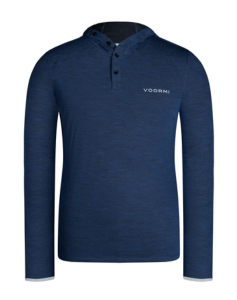
- DUAL SURFACE™ UL Precision Blended Wool
- Integrated thumb loops
- Buttoned, full-cover hood
- Odor-resistant and wicks sweat
- Retains some insulating properties when wet
Why we like it: Ridiculously lightweight and breathable
What we don’t like: Expensive
Materials: 52% merino wool, 48% polyester | Weight: 7 oz. | Pockets: No | UPF: 30
The Voormi River Run Hoodie ($139) is one of the lightest, full-coverage merino wool sun shirts on the market and our choice for the best natural fiber sun shirt. Chelsey has worn hers while guiding Denali and on backpacking trips above the Arctic Circle. She loves how odor-resistant it is, even on long expeditions. The merino wool helps wick sweat away while also insulating when wet. Thumb holes and a buttoned, full-cover hood offer great UV protection. though it has a lower UPF rating than other sun shirts.
Like most wool, the River Run Hoodie may be a little itchy when you first pull it on. Chelsey has very sensitive skin but finds that the itchiness fades quickly, especially as the fabric becomes worn in.
Best Button-Up Sun Shirt:
Outdoor Research Astroman Sun Shirt
Features: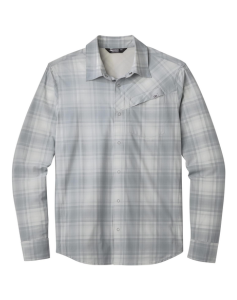
- AirVent™ inner back yoke aids ventilation
- Welted chest pocket with a secure snap closure
- Shirttail hem for a casual look
- Lightweight. stretchy, and bluesign® approved fabric
Why we like it: Stylish look for the front and backcountry, cooling, lightweight fabric
What we don’t like: No hood and shorter sleeves make for less coverage than other sun shirts
Materials: 85% nylon, 15% spandex | Weight: 6.1oz. | Pockets: Yes | UPF: 30-50+ depending on color
While we generally prefer sun shirts with hoods for maximum sun protection, we understand they’re not everyone’s preference. Hoodless, button-up sun shirts are a great option for those looking for a more stylish, versatile option. The Outdoor Research Astroman Sun Shirt ($110) is our pick for the best button-up sun shirt. This lightweight shirt is soft and cool on the skin, perfect for warmer days. The Astroman Sun Shirt is low on features, however. While there is a chest pocket with a snap closure, there are no zippered pockets and no thumb loops. Despite that, the plaid patterns, button-up closure, and shirttail hem make it a versatile option for both the backcountry and the frontcountry.
Check Women’s Price at Backcountry
About our testing process
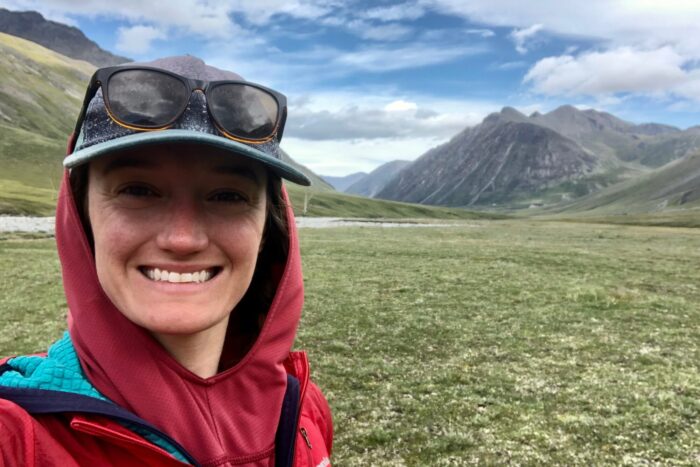
We like a sun shirt with a deep hood to help protect our face from UV rays. Photo: Chelsey Cook
Sun shirts have become more and more popular over the past decade and are now an integral part of many outdoor kits. Gear Editor Chelsey Cook started this guide to sun shirts in July 2024. She has been wearing sun shirts almost daily for over seven years, relying on their UPF rating and hoods to keep her skin safe whether she’s hiking, climbing, mountaineering, or packrafting. She tested the sun shirts in this guide on day hikes, backpacking trips, and longer expeditions in Alaska, Washington, Utah, Scotland, Peru, and the Faroe Islands. She wore them to the summit of Denali while on three-week canyoneering trips in Utah and while fishing to fill her freezer in the rivers of Alaska.
Chelsey is a professional mountain guide and routinely spends several consecutive weeks wearing a single sun shirt on expeditions. She looks for sun shirts that are loose, breathable, and odor-resistant. Because she spends so much time at altitude and on glaciers, where the sun’s UV rays are stronger, she also prioritizes high UPF ratings, thumb loops, and deep hoods for even more protection.
She wore sun shirts as much as possible while testing them for this guide, checking them for long-term comfort and durability. Chelsey also enjoys having a minimalist closet and looks for clothing that can pull double duty. She wore the sun shirts in this guide while traveling in Europe, out to local breweries, and to work meetings to ensure they fit in in the frontcountry as well as the backcountry.
Things to consider when buying sun shirts
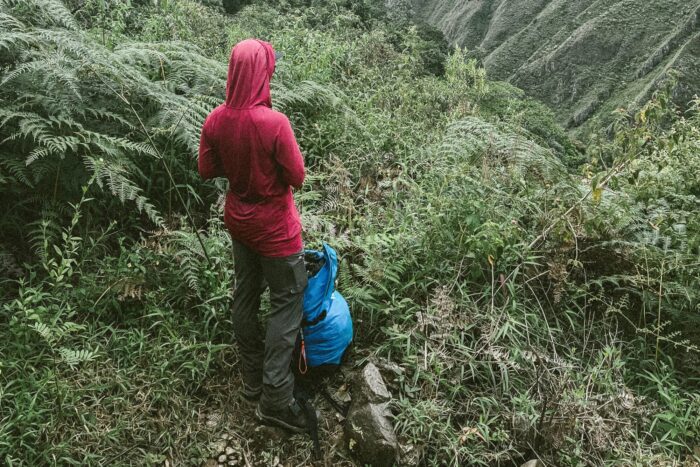
Chelsey prefers baggier sun hoodies because the larger hoods fully cover her face, and the looser fit is more cooling in hot climates. Photo. Chelsey Cook
UPF rating
UPF, or Ultraviolet Protection Factor, rates a fabric’s ability to filter out harmful UV light. Ratings usually fall between 15 and 50+; a rating of 30 allows about 3%, or 1/30th, of UV rays to pass through it.
Different variables affect a fabric’s UPF. Dark colors filter more UV rays out, as do thicker fabrics and tighter weaves. Sun shirts need to strike a balance between breathability and UV protection. All of the sun shirts in this guide have a UPF rating of 30 or above.
Materials
Most sun shirts are made from polyester, with a stretchy material like elastane incorporated as well. Polyester is durable, dries quickly, and offers good UV protection, while elastane increases airflow and stretchiness. There are downsides to this blend, however. Polyester tends to stink after repeated sweaty use, and elastane loses its springiness after a while. So your sun shirt may begin to stretch out over time.
Some sun hoodies are made out of natural fibers instead, like merino wool or beech tree pulp, like the Patagonia Tropic Comfort Natural Hoody. Natural fibers are a great, sustainable choice, and they don’t hold onto odor as strongly as synthetic fibers like polyester.
Breathability
Sun shirts are designed to be worn primarily in sunny conditions, so they should be comfortable in warm temperatures. A breathable sun shirt also dries quicker, whether wet from sweat or rainwater. It’s better to err on the side of lighter and more breathable than to look for a sun shirt that offers insulation. The sun shirt serves as a base layer and should be breathable enough to keep your temperature regulated when you’re working hard.
You can always add layers on top of your sun shirt if the temperature drops. The two most breathable sun shirts on this list are the Black Diamond Alpenglow Hoody and the Patagonia Tropic Comfort Natural Hoody.
Fit
Sun shirts generally have a relaxed fit, and Chelsey always sizes up her sun shirts to make them even looser. A looser fit increases breathability and will help move with you better. Larger sizes also have longer sleeves, providing more coverage for the backs of your hands. They also sometimes have deeper hoods; Chelsey likes to have a hood large enough to cover the brim of her baseball cap to give her face maximum protection from the sun.
Features
Sun shirts are inherently straightforward pieces of gear. Thumb loops are one of the few features offered. Your fingers and hands are exposed to a lot of sun when you’re outside and are susceptible to skin cancer. Thumb loops help pull the sun shirt’s sleeves over the backs of your hands, affording them more protection. Most sun shirts have hooded pullover thumb loops, though some have simple elastic loops for your thumbs. The hooded pullover thumb loops offer more protection.
Some sun shirts also come with pockets, a feature we appreciate. The pockets are rarely large enough for your phone but are great for stashing keys, chapstick, or small sunscreen face sticks. They’re generally zippered, and their location depends on the sun hoody. They can be along the hem, at the chest, or on your side. We prefer them anywhere but along the hem; they tend to get in the way of climbing harnesses and backpack hip belts when they’re that low.
Frequently asked questions about sun shirts
Are sun shirts worth it?
Sun shirts are a fantastic way to protect yourself from harmful UV rays and lower your risk of skin cancer. Sun shirts with a high UPF rating block most UV rays and provide added coverage for your arms, the backs of your hands, and your face.
Should I wear a sun shirt when it’s cloudy?
While clouds may filter out some UV, they can amplify them in other cases. It’s important to wear sunscreen and sun shirts even when it is cloudy out.
What is the best color to wear for sun protection?
Dark colors, like blue and black, absorb more UV rays than lighter shades like white, blocking them from your skin. For maximum protection, stick to dark sun shirts.
